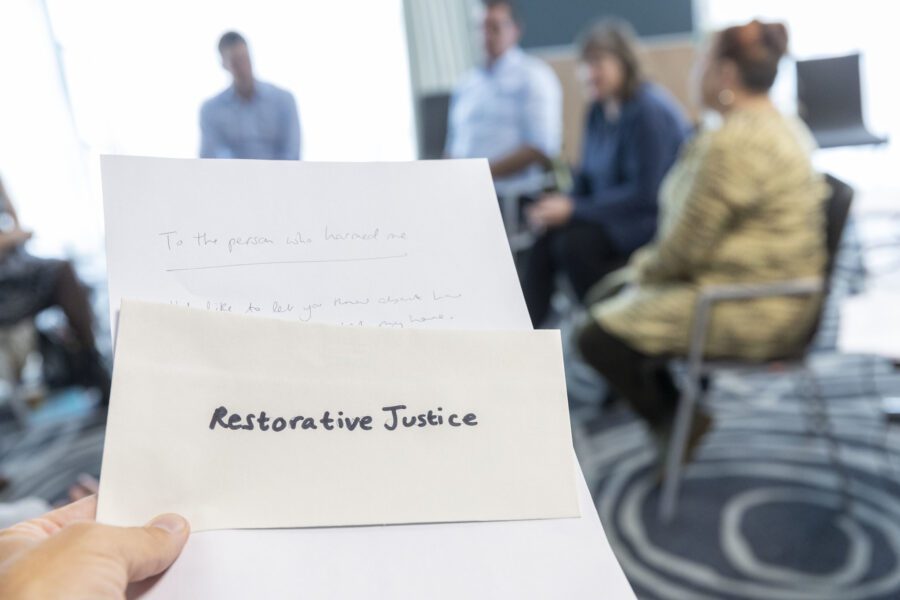Raising Awareness and Advocacy for Restorative Justice in Scotland
Community Justice Scotland’s restorative justice development officer Inesa Vėlavičiūtė talks about the role of Restorative Justice in reshaping the justice system

Volunteering for the Scottish Mental Health Arts Festival this year reminded me of the importance of talking loud and clear about the causes we believe in to ensure people make the most out of help available and know how to find it. The festival questioned how to bring about a ‘revolution’ in mental health. This made me think of restorative justice and question what a revolution would look like in a justice system that has not changed for a long time and has been the subject of debate and critique.
I believe the answer lies in putting our shared humanity at the centre of our systems and prioritising the value of empathy, accountability, healing the harm caused, and community-building. That’s where restorative justice (RJ) comes in. It is a voluntary and consent-based process offering a contact between someone who has experienced harm and the person responsible. It’s a service that is currently available in just a few areas of Scotland, and the Scottish Government aims to make it widely available for everyone. Because of this, as well as its benefits, RJ can indeed be considered revolutionary. It approaches wrongdoing from a holistic standpoint, recognising that the consequences extend far beyond the immediate incident and provides an opportunity to address the harm caused as opposed to solely focusing on punishment. It also provides potential for healing and reconciliation and aims to address the underlying causes of crime and prevent future offences.
However, for such a transformative approach to succeed in reshaping our society, it is crucial to ensure that its principles are understood and embraced by the public and services. In order to do this, we need more than a shift in systems. We need a shift in mindsets. And to create that, we need effective communication, education, and active engagement with communities and individuals.
Attending the festival’s events, exhibitions and workshops that ignited conversations and challenged perceptions reminded me that education lies at the heart of any transformative change. By educating individuals about RJ, we empower them to advocate for its implementation. And communication plays a pivotal role too. We need to challenge preconceived notions and dispel misconceptions about restorative justice through open conversations.
Another crucial aspect in ensuring the success and sustainability of RJ is active engagement with people in shaping the service by giving them a say in what the restorative justice service should look and feel like. In March 2023, Community Justice Scotland were commissioned to complete a series of world café consultations and interviews with individuals who have lived experience of harm in an attempt to discuss their views on RJ and its principles. The discussions considered what people need in a trauma-informed service that respects choice, safety, preparation, togetherness and individuality. The participants’ considered feedback and honest accounts of their experiences are now being used to inform the development of the RJ service across Scotland including a person-centred policy together with screening tools. Empowering those who access services to have meaningful involvement in how their care is designed and delivered ensures the services created will be effective and practical, offering people what works for them.
Changing people’s perception of the traditional justice system and fostering a belief in the power of restorative justice requires a collective effort. It demands open conversations, community engagement, and creating platforms for dialogue. By engaging with diverse audiences, including policymakers, justice professionals, community leaders, and the general public, we can encourage that mindshift and inspire people to become advocates for RJ. Let’s continue the conversation and commit to raising awareness in our journey towards a more compassionate and inclusive Scotland.
For more information about how restorative justice works, its benefits and Scotland’s progress with the development of services visit our RJ Learning Hub.
